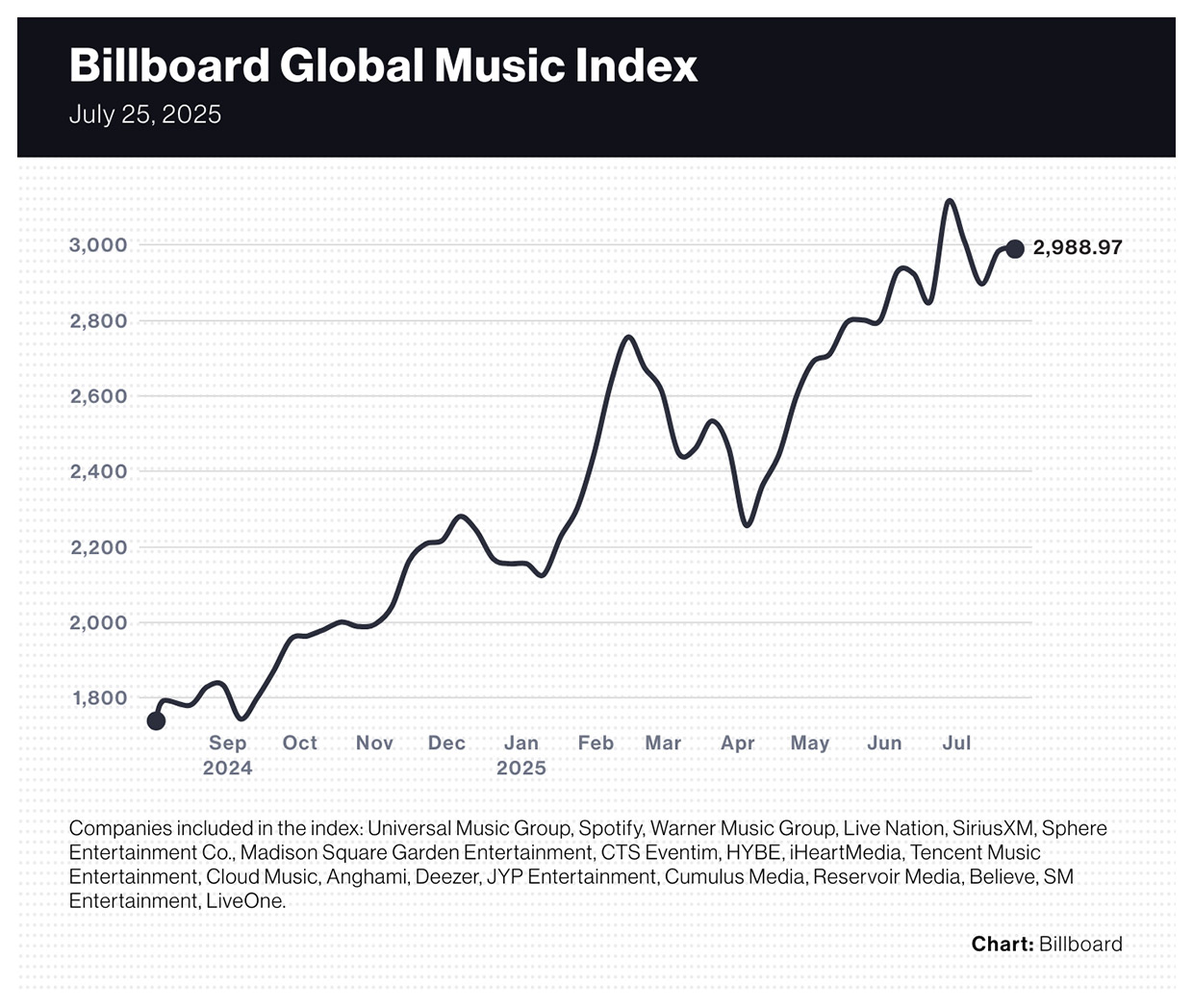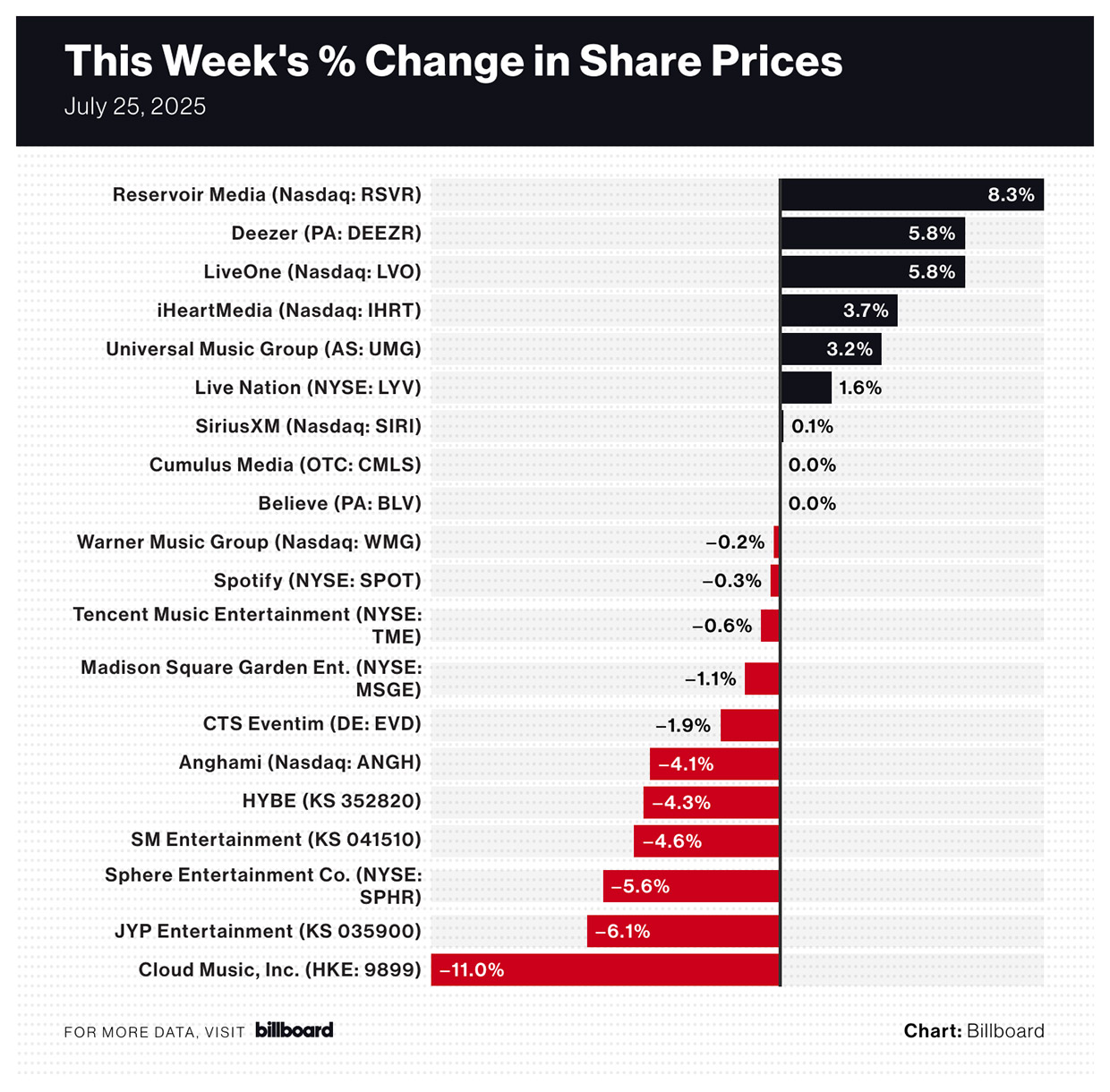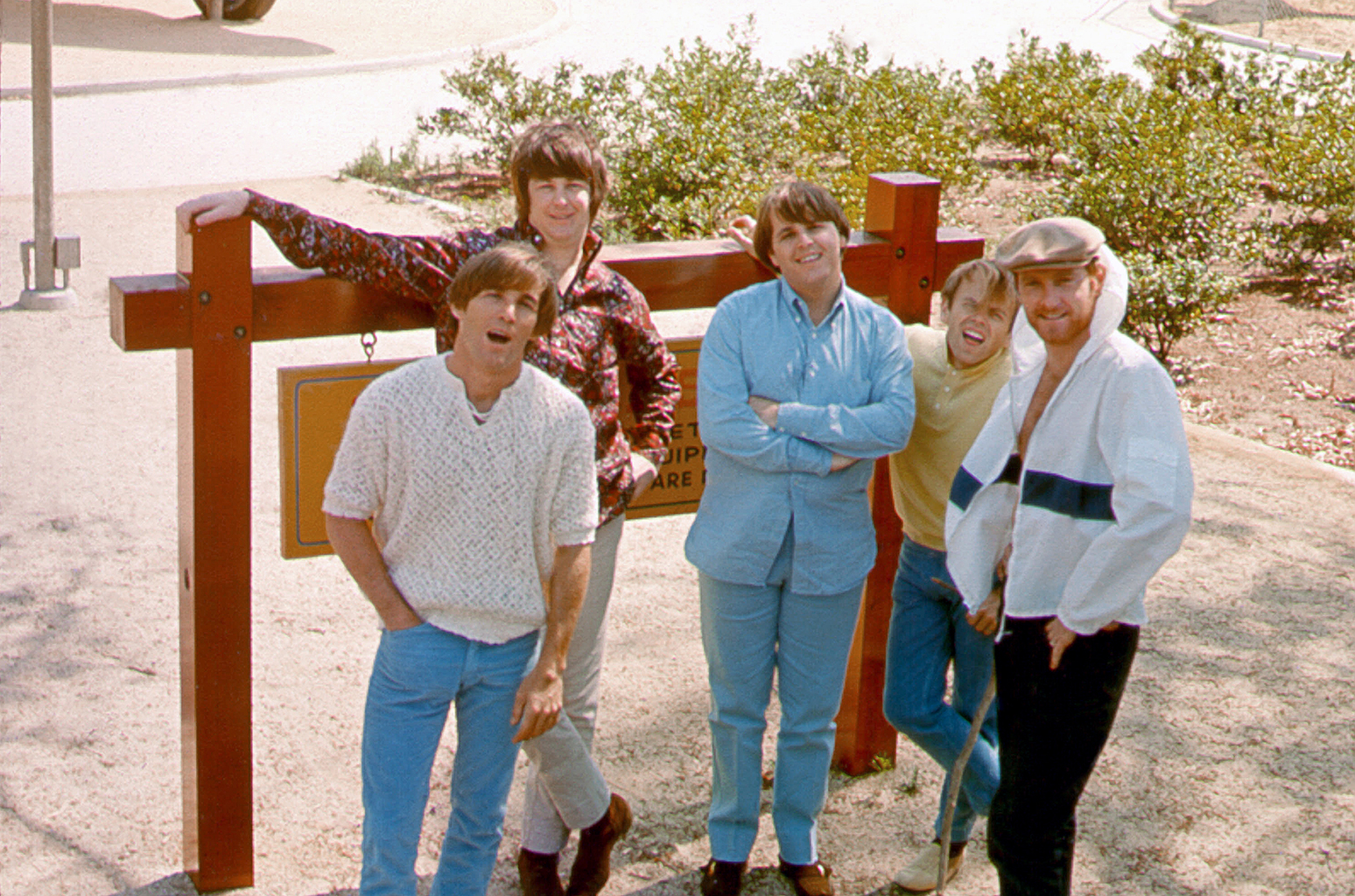
Created with Datawrapper

While the S&P 500 reached a new record close every day this week, music stocks had more middling performances and K-pop companies extended their losses.
HYBE, home to BTS, fell 4.3% this week as the company faces problems on multiple fronts ahead of its Aug. 6 earnings call. According to reports out of South Korea, HYBE’s headquarters in Seoul were raided on Thursday (July 24) as part of the government’s ongoing investigation into alleged stock fraud by the company’s founder and chairman, Bang Si-hyuk. On Tuesday, three HYBE employees were convicted of insider trading and given jail time.
Things were looking up for HYBE just last month. In early June, HYBE shares rose on news that six of seven BTS members had finished their military duty, marking a step in the group’s long-awaited return. But after reaching a high mark for 2025 of 316,000 KRW ($228.54) on June 24, HYBE shares have fallen 18.8%.
K-pop stocks are in the midst of a summer slump. SM Entertainment dropped 4.6% this week and has fallen 11.6% over the last five weeks. YG Entertainment is down 12.7% over the last four weeks after slipping 2.1% this week. JYP Entertainment sank 6.1% this week, but its loss over the last six weeks is a more modest 7.2%. Despite the recent downturns, the four K-pop companies have had a strong 2025, posting an average year-to-date gain of 45.0%.
The 20-company Billboard Global Music Index (BGMI) rose 0.2% to 2,988.97 for the week ended Friday (July 25), bringing its year-to-date gain to 40.7%. Only seven stocks finished the week in positive territory, while 11 stocks were in the red and 2 stocks were unchanged. Believe, which is implementing a mandatory squeeze-out to obtain the remaining 1.27% of outstanding shares that weren’t acquired during a tender offer, finished the week unchanged. Its shares ceased trading on Monday, and Believe will not publish its mid-year results.
Led by Spotify on Tuesday (July 29), a number of music companies report earnings next week. Although Spotify’s share price has been in a slump, some analysts have upped their price targets ahead of the company’s quarterly earnings announcement. This week, Deutsche Bank upped its price target to $775 from $700 and maintained its “buy” rating. Oppenheimer raised its Spotify price target to $800 and upgraded the stock to “outperform” from “market perform.”
Shares for Deezer, which reports on Wednesday (July 30), were up 5.8% to 1.27 euros ($1.49). Universal Music Group, which releases earnings on Thursday (July 31), rose 3.2% to 27.85 euros ($32.72). SiriusXM, which gained 0.1% to $23.58, also reports on Thursday.
Meanwhile, Live Nation is slated to report earnings on Aug. 6. The concert promoter’s share price increased 1.6% to $152.98 this week, marking its highest closing price since Feb. 24.
Netease Cloud Music, which had been on a hot streak over the previous eight weeks, was the biggest loser of the week after dropping 11.0% to 269.00 HKD ($34.27). Sphere Entertainment Co. also had a large decline, falling 5.6% to $43.59 as numerous reports this week highlighted a decline in tourist visits to Las Vegas.

Created with Datawrapper

Created with Datawrapper

Created with Datawrapper

Tim Dillon will not be traveling to the Riyadh Comedy Festival next month. The California comedian and host of The Tim Dillon Show podcast says he was fired from the Oct. 8 Saudi Arabia festival for comments he made about the country on Joe Rogan‘s podcast.
Besides losing a $375,000 payday (an amount Dillon confirmed to Rogan), he also lost a nearby warm-up gig in Dubai two nights before his Riyadh appearance after mixing up the Arab emirate with Abu Dhabi (the rival cities are both part of the United Arab Emirates).
“I mixed them up — apparently this is a big deal over there. This is a real problem,” he said on a recent episode of his podcast. “This is not a malicious slander. It’s a mistake.”
The Riyadh Comedy Festival — which mostly takes place at the Bakr Al-Sheddi Theatre and ANB Arena from Sept. 25 to Oct. 9, features a number of top tier comedians including Dave Chappelle, Bill Burr, Gabriel Iglesias, Aziz Ansari, Kevin Hart, Jeff Ross, Chris Distefano, Tom Segura, Jo Koy, Sam Morril, Hannibal Buress, Andrew Schultz, Sebastian Maniscalco, Whitney Cummings, Jimmy Carr, Louis CK, Pete Davidson, Russell Peters and Chris Tucker.
“Supposedly, MBS is a fan of mine,” Dillon said two weeks ago on the Joe Rogan Experience podcast, referring to Saudi head of state Mohammed Bin Salman.
Dillon was reportedly fired from the festival for claiming that Saudi Arabia relies on slave labor — a controversial take on the country’s foreign laborers laws that some groups, including Human Rights Watch, have criticized as “slavery-like.” Legally, slavery was abolished in the Kingdom in the 1960s.
Dillon said the slavery jokes were a misunderstanding with his Saudi hosts, saying on his podcast, “I was defending them for having slaves. I literally said, ‘Slaves are hard workers and for the most part agreeable.’ But they didn’t like that.”
“You can literally support somebody too much,” he added. “In life, this happens. Too many compliments; too much support — and then they turn on you.”
He clarified his comments further, noting, “If i was a slave — not that I want to be one, but if I was and I built this really nice thing, I might say to my slave children, ‘Daddy built that,'” concluding, “Apparently this got to the people in Saudi Arabia and they were unhappy about it.”
The Riyadh Comedy Festival opens Sept. 25 with performances by Burr, Maz Jobrani and Andrew Santino and Bobby Lee from the Bad Friends podcast. More here.

Wilson Phillips, Kenny Loggins, David Pack of Ambrosia and more are set to perform at a charity concert celebrating the music of Brian Wilson and The Beach Boys on Saturday, Sept. 27 at the Granada Theatre in Santa Barbara.
Wilson Phillips features two of Wilson’s daughters, Carnie and Wendy Wilson, as well as Chynna Phillips, the daughter of John and Michelle Phillips. The concert will also feature Brian Wilson’s grandchildren, so it will spotlight three generations of the Wilson family.
The concert, dubbed An All-Star Tribute to the Music of Brian Wilson & Songs of The Beach Boys, will feature the Folk Orchestra of Santa Barbara. Other guest performers are expected to include The Honeys; former members of The Beach Boys and the Brian Wilson Band; and keyboardist Don Randi (The Wrecking Crew); with appearances by Rosemary Butler (Jackson Browne), Ken Stacey (Elton John), Hunter Hawkins (Kenny Loggins), Carly Smithson (American Idol), Alisan Porter (The Voice) and poet Stephen J. Kalinich. These acts will be backed by The Tribe Band, who will perform an array of Beach Boys favorites.
The show begins at 7:30 p.m. Here’s a link for tickets. VIP packages are also available.
Proceeds will be donated to Adam’s Angels, a local group of volunteers, and the Surfrider Foundation of Santa Barbara, dedicated to the protection and enjoyment of the world’s oceans and beaches.
Brian Wilson died on June 11 at age 82. He was the third member of the fabled group to pass, following brothers Dennis in 1983 at age 39 and Carl in 1998 at age 51.

THE BIG STORY: If you needed another clear sign that artificial intelligence is seeping into every aspect of American cultural life, here’s one: An AI artist just signed a record deal, the hallowed milestone of success for any emerging musician.
As first reported by Billboard last week, Xania Monet — the avatar of a woman named Telisha Jones who writes her own lyrics but uses Suno to create the music — inked a record contract worth millions. The deal has quickly become the talk of the industry, including from stars who have spoken out, including Kehlani, who said: “I don’t respect it.”
But…what exactly is a label buying here? It remains unclear the extent to which you can secure intellectual property rights to AI-generated songs, raising hurdles for monetizing them. And platforms like Suno are still facing trillion-dollar infringement lawsuits that essentially claim the technology itself is illegal. For more, go read our full story.
You’re reading The Legal Beat, a weekly newsletter about music law from Billboard Pro, offering you a one-stop cheat sheet of big new cases, important rulings and all the fun stuff in between. To get the newsletter in your inbox every Tuesday, go subscribe here.
BLIGE CASE TOSSED – A federal judge dismissed a lawsuit against Universal Music Group claiming Mary J. Blige’s enduring 1992 hit “Real Love” infringed the oft-sampled 1973 funk song “Impeach the President” by the Honey Drippers, which has been used by Run-DMC, Dr. Dre, Doja Cat and many others over the years. The judge said the two songs were so different that nobody would hear the earlier song: “The songs do not sound the same.”
DIDDY SENTENCING – Attorneys for Sean “Diddy” Combs urged a federal judge to sentence him to just 14 months in prison on his prostitution convictions, asking him to reject the kind of “draconian” punishment sought by prosecutors. Because the star has already served 13 months in jail since he was arrested, that sentence would see him released almost immediately: “It is time for Mr. Combs to go home.”
LETTERS OF SUPPORT – To help make that argument, Diddy’s lawyers filed dozens of letters from supporters, pleading with the judge to show lenience toward the rapper when he sentences him next month. They came from Diddy’s mother and kids, from ex-girlfriend Yung Miami and from an executive at hip-hop label Quality Control Music — among many others.
SUNO SUIT 2.0 – Separate from the Xania Monet situation, the major record labels filed an amended version of their copyright lawsuit against the AI music firm, adding new allegations that the company illegally “stream-ripped” songs from YouTube to train its models. That’s a hugely important new claim: In a separate such lawsuit against Anthropic, a federal judge ruled this summer that AI training itself is likely a legal “fair use” but that using pirated works to do it could lead to many billions in potential damages.
FTC, YEAH YOU KNOW ME – The Federal Trade Commission filed a lawsuit against Live Nation and Ticketmaster accusing the concert giants of advertising misleading ticket prices and allowing scalpers to buy up tickets and resell them at inflated prices. The case came months after the agency sued a ticket broker that allegedly used thousands of fake Ticketmaster accounts to buy and resell tickets to Taylor Swift concerts and other events — and two years after Live Nation was hit with a sweeping monopoly lawsuit by the U.S. Department of Justice.
HYPE VID SETTLEMENT – Mike Tyson settled a lawsuit claiming he illegally used the Jay-Z, DMX and Ja Rule song “Murdergram” in an Instagram video promoting his boxing match against Jake Paul. The case was filed by Ty Fyffe, a producer and co-writer of the 1998 track who claimed that Tyson had willfully infringed his copyrights by using the song in a training video ahead of his much-hyped fight with Paul.
LOSE YOUR … CASE? – Meta urged a federal judge to dismiss a lawsuit from Eight Mile Style, a music publisher that owns hundreds of Eminem songs, which claims the social media giant made “Lose Yourself” and other iconic tracks available to billions of users. In the motion, Facebook’s lawyers argued the case was “remarkably short on specifics” about actual infringing material: “Fanciful estimates are not a substitute for well-pleaded facts,” the company wrote.
NEVER MEANT TO CAUSE YOU ANY PAIN – The Prince estate asked a judge to dismiss a lawsuit by the late singer’s Purple Rain co-star Apollonia (Patty Kotero) that claims the estate is trying to “steal” her name, arguing it has no intention of forcing her to change her name — and has repeatedly told her as much. The filing did say, however, that Apollonia secured her own trademarks during “the chaotic period following Prince’s death.”
SEX TAPE LEAK CASE – Colombian pop star Beéle was hit with a lawsuit alleging invasion of privacy and sexual cyberharassment from ex-girlfriend Isabella Ladera, claiming he is responsible for leaking their sex tape. Beéle’s reps have denied that he was the source of the leak and said the singer is “also a victim,” but Ladera’s lawsuit placed the blame squarely on him: “Only two people had the videos, and Ladera had already erased them almost a year and a half before.”
MEGAN THEE PLAINTIFF – Lawyers for Megan Thee Stallion argued in court filings that the social media personality DJ Akademiks must reveal whether Tory Lanez sent him a confidential DNA testing report during the singer’s criminal case. The filings came amid discovery in a defamation case against Milagro Gramz, a gossip blogger and ardent online defender of Lanez.


New Kid and Family Movies in 2025: Calendar of Release Dates (Updating)


Brooklyn Mirage Has Been Quietly Co-Managed by Hedge Fund Manager Axar Capital Amid Reopening Drama
The best sexting apps in 2025


Kid and Family TV Shows in 2025: New Series & Season Premiere Dates (Updating)


Every potential TikTok buyer we know about
iOS 18.4 developer beta released — heres what you can expect


Are You an RSSMasher?


DOGE-ing toward the best Department of Defense ever